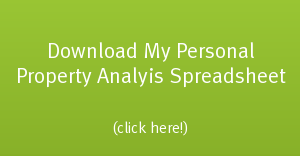“The tenants won’t pay the rent, you’ll go into foreclosure, lose the house, destroy your credit, and ruin your entire future. What you need to do is go to law school, get a job at a nice law firm, work eighty hours per week for ten years to become a partner, then after forty years you can retire as a millionaire.”
This was the advice I got from my Dad when I told him I wanted to go into real estate investing. Not exactly the encouragement I was hoping for.
At the time, I had just graduated from college and was working a minimum wage job. I had heard all my life “you WILL go to college and land a great job.”
Only, the job didn’t come. I may have graduated summa cum laude from college, but each interview I took I was told I had:
- not enough experience
- not enough schooling
- or just not “right for the job.” (Sound familiar? You aren’t alone!)
Thus, the only job I could get was an overnight shift at a group home for the developmentally disabled while I studied for the Law School Admissions Test. I had accepted my fate of working overtime for the rest of my life in a career I had no interest in, simply because it was “the way things are done.” I honestly believed my life had peaked in college and I was on the slow decline toward slavery and eventual death (old, fat, miserable, but probably rich).
This is when my interest in real estate began to develop. I had begun watching the “flipping” shows where entrepreneurs bought, remodeled, and sold homes to make large sums of profit. I had no construction ability, but I began to devour every piece of information I could about this “flipping” of homes. I slowly learned that investing was more than just flipping, and that true wealth was in the collection of rentals.
I called my Dad to tell him of my new career in real estate investing- thus the, “you will ruin your entire future” speech I began this story with.
With that, I was back to studying for Law School.
TV is just TV, and in real life – people ruin their lives with real estate. My dad was not the only one advising against it. Everyone has a story of an uncle who invested in real estate and lost money to deadbeat tenants. It was fact, or so I thought.
Brandon, Meet BiggerPockets.
I decided to Google my concern. “What to do when a tenant doesn’t pay.”
My search brought me to a website known as BiggerPockets, and it changed, and I would even say “saved,” my life.
For those of you not familiar with BiggerPockets.com, it is a social network for real estate investors. The site is home to (currently) nearly 100,000 members, thousands of blog posts, hundreds of articles, and enough forum discussions to keep you reading for years.
For the first time, I realized there were answers to the “you’ll ruin your life” objections. There were people actually investing in real estate, and making a killing off it.
I can still remember the feeling of knowing there was hope.
I didn’t have to suffer through forty years of a job I hated. I could actually craft a career around something I enjoyed. The income I could make was unlimited and I could be excited to wake up each morning.
Since that day, hardly a week has gone by that I have not been on the site reading articles, asking questions, connecting with others, and learning everything I could.
I love reading books on real estate, but interacting on the forums is like reading a living book. I could ask a question, and often immediately I would receive back suggestions, ideas, and other help from seasoned real estate investors who have been there, done that.
A New Life
When I say “BiggerPockets” saved my life, I truly believe it. It saved me from a life that had been chosen for me, but I did not want. It saved me from the “slave-save-retire-die model” that nearly every American believes is the only way.
Not only did BiggerPockets save my life, it also gave me a life. It helped me on my journey to become a real estate investor, which I now do full-time. I wake up each day excited for the work that I do – because it’s mine. I don’t report to any others (except “the Mrs.”) and have a free reign to express my creativity.
BiggerPockets continues to help me out, even today. There is a good chance that you are reading this blog after finding me through BiggerPockets. The majority of all my traffic on my site comes from BiggerPockets. Last month I was asked to become a regular contributor on the BiggerPockets Blog which has been an awesome experience and I hope I can give back to the community that has helped me so much.
If you are not currently a member of BiggerPockets or don’t regularly get involved, I highly suggest you get connected. Follow me on BiggerPockets by visiting my profile here. Get involved in the forums, read and comment on blog posts (especially mine, currently on Sundays), like them on Facebook, and start to grow. You never know, BiggerPockets might just save your life as well.
P.S. – My Dad has since come around and is now my biggest private investor. We own several properties together and are continually talking about “the next property.” Thanks Dad for all your support! I think you’d agree I make a much better investor than I would have a lawyer!
If you enjoyed this article, I hope you’ll take a minute and share it on Facebook, Twitter, or any other social networks you have! If you want to receive each post from “Real Estate In Your Twenties” delivered free to your email inbox, please sign up in the bar on the top of this page.
Also – be sure to download my free e-book “7 Years to 7 Figure Wealth.” It’s totally free, no up-sell, no affiliate nonsense.
Just a good ‘ol fashion plan.
P.S. looking for hard money loans in California? Be sure to check out my friends over at northcoastfinancialinc.com. They have very competitive rates, can fund within a week and specialize in fix and flip loans and other hard money loans.
 If this is your first time here at Real Estate In Your Twenties.com - welcome!
If this is your first time here at Real Estate In Your Twenties.com - welcome! 





